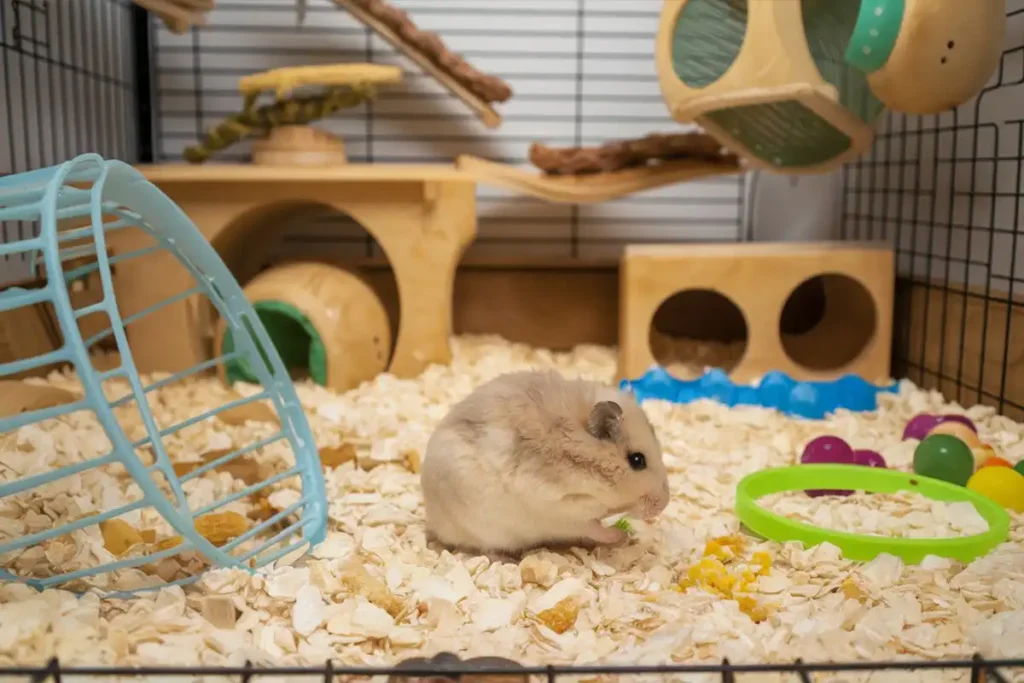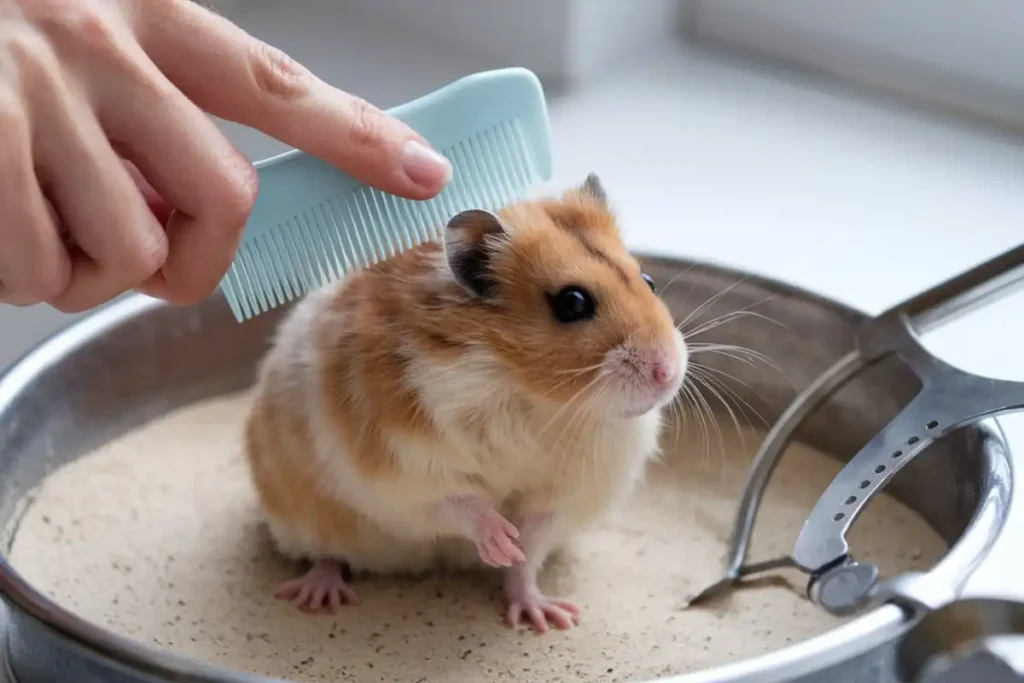Syrian hamster lifespan is a crucial consideration for anyone who wants to keep these adorable rodents as pets. These small, furry companions bring joy and entertainment, but their lifespans are relatively short compared to other household pets. Most Syrian hamsters live between 2 to 3 years, but with proper care, some can reach 4 years or more. Understanding what affects their lifespan helps owners provide the best care possible.
Several factors influence how long a Syrian hamster lives, including genetics, diet, habitat, exercise, and overall health care. A well-balanced diet, a clean and spacious cage, and regular exercise can significantly impact their longevity. Syrian hamsters rely on their owners for everything, from nutrition to medical attention, so creating the perfect environment for them is essential.
If you want your furry friend to live a long, happy life, you need to know what to do—and what to avoid. This guide covers everything from proper nutrition to preventing common health issues, ensuring that your Syrian hamster thrives for as long as possible.
How Long Do Syrian Hamsters Live?
Average Lifespan of Syrian Hamsters in Captivity vs. the Wild
Syrian hamsters live much longer in captivity than in the wild. In their natural habitat, they face constant threats from predators, harsh weather, and food shortages. Wild Syrian hamsters usually survive for one to two years because they must constantly search for food while avoiding dangers like owls, foxes, and snakes. Disease and territorial fights also shorten their lifespan.
In contrast, a well-cared-for pet Syrian hamster can live two to three years, with some reaching four years or more. Domesticated hamsters get consistent food, fresh water, and medical attention, which dramatically improves their lifespan. Proper nutrition, a safe and clean habitat, and mental stimulation all contribute to a longer life. Syrian hamsters rely on their owners for everything, so creating the best possible environment helps them live to their full potential.
Factors Affecting Their Lifespan (Genetics, Environment, Care)
Several factors determine how long a Syrian hamster will live. Genetics play a major role, as some hamsters naturally have stronger immune systems and longer lifespans. If a hamster comes from a reputable breeder, it will likely have a healthier genetic background compared to one from a pet store.
The environment also makes a big difference. Syrian hamsters need a large, well-ventilated cage with proper bedding, a secure hideout, and enough space to move around. A poor living environment can lead to stress and health problems, cutting their life short. Temperature control matters as well—extreme heat or cold can cause serious health issues.
Care is the biggest factor in extending a Syrian hamster’s lifespan. A well-balanced diet with high-quality pellets, fresh vegetables, and occasional protein treats keeps them strong. Regular exercise on a safe running wheel prevents obesity and promotes heart health. Owners should also keep their cage clean and minimize stress by handling them gently and avoiding loud noises.
Signs of Aging in Syrian Hamsters
As Syrian hamsters age, they slow down and show noticeable physical and behavioral changes. A once-active hamster may spend more time sleeping and show less interest in running on its wheel. Some older hamsters develop thinning fur, especially around their face and legs, while others may experience weight loss or a hunched posture.
Their senses also decline with age. Vision and hearing may weaken, making them less responsive to movement or sounds. Their teeth, which continuously grow throughout their life, may become brittle or overgrown, making it difficult to eat. Dental problems can lead to weight loss and malnutrition if not addressed.
Older Syrian hamsters may also develop common age-related health issues, such as arthritis, respiratory infections, or tumors. Regular health check-ups and close monitoring help owners detect early signs of illness. Providing soft bedding, easy-to-chew food, and a stress-free environment improves their quality of life as they grow older.
By recognizing these signs early, owners can make adjustments to keep their aging hamster comfortable and happy during its final years.
Creating the Ideal Habitat for a Long Life
Importance of a Spacious Cage and Proper Ventilation
A spacious cage is one of the most important factors in ensuring a long and healthy life for a Syrian hamster. These animals are solitary and territorial, requiring enough space to move, burrow, and explore. A cage that is too small leads to stress, obesity, and behavioral issues like bar biting. The minimum recommended cage size for a Syrian hamster is at least 450 square inches of unbroken floor space, but larger enclosures are always better.
Proper ventilation is equally important. A well-ventilated cage prevents the buildup of ammonia from urine, which can cause respiratory issues. Glass tanks, while spacious, require a mesh lid to allow for airflow. Wire cages provide better ventilation, but they must have narrow bar spacing to prevent escape. A hamster living in a well-ventilated and spacious cage experiences less stress, better mental stimulation, and a healthier lifespan.

Best Hamster Bedding for Comfort and Hygiene
Choosing the right hamster bedding plays a crucial role in maintaining a Syrian hamster’s hygiene and comfort. Bedding should be soft, absorbent, and safe for burrowing. Paper-based bedding is the best choice because it is dust-free, highly absorbent, and gentle on the hamster’s skin. Brands that offer unscented, chemical-free paper bedding help reduce respiratory risks.
Wood shavings like aspen are another safe option, but avoid pine and cedar shavings because they release harmful oils that can cause respiratory problems. Bedding depth is just as important as the material—Syrian hamsters are natural burrowers and need at least 6 inches of bedding to dig tunnels and create nests. Deeper bedding allows them to mimic their natural burrowing instincts, which reduces stress and promotes overall well-being.
Keeping bedding clean is essential for a healthy habitat. Spot-cleaning the cage daily and performing a full bedding change every two to four weeks prevents bacteria buildup and odor. A clean environment lowers the risk of respiratory infections and skin irritations, both of which can shorten a hamster’s lifespan.
The Role of an Exercise Wheel in Maintaining Health
An exercise wheel is a must-have for Syrian hamsters. In the wild, these small rodents travel miles every night in search of food. In captivity, they need a proper outlet for their energy. Without exercise, hamsters can become overweight, which leads to serious health problems like diabetes and heart disease.
The right exercise wheel size prevents spinal issues. A Syrian hamster needs a wheel that is at least 10 to 12 inches in diameter to keep its back straight while running. A wheel that is too small forces a hamster to arch its back unnaturally, which can lead to long-term spinal injuries. Solid-surface wheels are the safest option because wire or mesh wheels can cause foot injuries.
Regular wheel running helps keep a hamster’s cardiovascular system healthy while also reducing stress and boredom. Hamsters that do not get enough exercise may develop aggressive or anxious behaviors. Providing an appropriately sized, safe exercise wheel ensures that a hamster stays active, maintains a healthy weight, and lives a longer, happier life.
Nutrition: The Best Diet for Syrian Hamsters
Essential Nutrients for a Healthy Hamster Diet
A well-balanced hamster diet plays a key role in extending a Syrian hamster’s lifespan and keeping it active and healthy. These small rodents need a variety of nutrients to maintain strong bones, a healthy immune system, and proper digestion.
A high-quality commercial hamster pellet should make up the majority of their diet. These pellets provide the right balance of protein (15-20%), fiber (8-10%), and fat (4-6%) to support overall health. Fresh vegetables, such as carrots, cucumbers, and bell peppers, add essential vitamins and minerals. A small amount of protein from sources like cooked egg, plain chicken, or mealworms helps keep their muscles strong.
Hamsters also need a constant supply of chewable foods like nuts, seeds, or wooden chew sticks to maintain their dental health. Their teeth never stop growing, and without proper chewing, they can develop painful overgrowths that make eating difficult. By providing a nutrient-rich diet, owners can prevent deficiencies and ensure their hamster stays energetic and healthy.

Safe and Unsafe Foods for Syrian Hamsters
Not all human foods are safe for Syrian hamsters. Some foods provide excellent nutrition, while others can cause serious health problems.
Safe Foods:
- Vegetables – Carrots, broccoli, bell peppers, cucumbers, spinach (in moderation)
- Fruits – Apples (seedless), bananas, blueberries, strawberries (small portions)
- Proteins – Cooked egg, plain chicken, mealworms, tofu
- Grains – Whole oats, cooked rice, plain whole-grain pasta
- Nuts and Seeds – Sunflower seeds, flaxseeds, unsalted peanuts (small amounts)
Unsafe Foods:
- Sugary or Processed Foods – Chocolate, candy, bread, chips
- Toxic Foods – Onions, garlic, citrus fruits, almonds, raw potatoes
- High-Water Content Foods – Lettuce and watermelon (cause diarrhea if given in excess)
Feeding a Syrian hamster the wrong foods can lead to obesity, diabetes, and digestive issues. Offering fresh, hamster-safe foods in moderation ensures a well-balanced diet while avoiding potential health risks.
Importance of Fresh Water and Occasional Treats
Syrian hamsters need constant access to fresh, clean water to stay hydrated and healthy. Dehydration can quickly lead to weakness, digestive problems, and overheating. A water bottle with a metal spout works best because it keeps water clean and prevents spills. Checking and refilling the water daily ensures that the hamster always has enough to drink.
Occasional treats provide enrichment and strengthen the bond between a hamster and its owner. Safe treats include small pieces of fruit, plain nuts, or sugar-free hamster biscuits. However, treats should only make up 5-10% of their diet to prevent weight gain.
Avoid store-bought treats that contain artificial sugars, as Syrian hamsters are prone to diabetes. Instead, offering natural treats in moderation keeps them happy without compromising their health. Fresh water and carefully chosen treats contribute to a well-rounded diet, helping a hamster maintain a long, healthy life.
Common Health Issues and Preventative Care
Common Illnesses Affecting Syrian Hamsters
Syrian hamsters can develop several health problems throughout their lives, and early detection is key to preventing serious complications. Some illnesses occur due to poor hygiene, improper diet, or aging, while others result from genetic factors.
One of the most common and dangerous diseases in Syrian hamsters is wet tail, a bacterial infection that causes severe diarrhea, dehydration, and lethargy. This condition often affects young hamsters, especially those under stress. Without immediate veterinary treatment, wet tail can become fatal within 48 hours.
Other common illnesses include respiratory infections, which cause sneezing, labored breathing, and nasal discharge. These infections often develop due to poor cage ventilation, dirty bedding, or exposure to drafts. Skin conditions, such as mites or fungal infections, lead to excessive scratching, hair loss, and scaly patches. Syrian hamsters are also prone to dental problems, such as overgrown teeth, which make eating painful and difficult.
Recognizing these common illnesses early and seeking veterinary care ensures a hamster receives the proper treatment before the condition worsens.
Regular Health Check-ups and Signs of Sickness
Performing regular health check-ups at home helps owners catch potential health problems before they become serious. Checking a hamster’s eyes, fur, skin, teeth, and droppings on a weekly basis provides early warning signs of illness. A healthy hamster should have bright, clear eyes, a clean and well-groomed coat, and active behavior.
Signs of sickness include:
- Lethargy or lack of movement – If a normally active hamster suddenly becomes sluggish, it could indicate illness.
- Loss of appetite or weight loss – A decrease in eating habits may signal dental problems, digestive issues, or infections.
- Unusual breathing sounds – Wheezing, coughing, or heavy breathing can be signs of a respiratory infection.
- Discharge from eyes, nose, or mouth – Any abnormal secretions may indicate infections or underlying health conditions.
- Diarrhea or wet tail symptoms – Soft stools, a wet bottom, and a bad smell require immediate veterinary attention.
Bringing a hamster to the vet for an annual check-up helps ensure long-term health. If any unusual symptoms appear, scheduling a vet visit as soon as possible prevents further complications.
How to Provide Proper Health Care for Hamsters
Caring for a Syrian hamster’s health starts with preventative measures. Keeping the cage clean and well-ventilated reduces the risk of respiratory infections and skin conditions. Spot-cleaning the bedding daily and doing a full cage clean every two to four weeks maintains hygiene.

A balanced hamster diet with the right mix of proteins, fibers, and fresh vegetables strengthens the immune system and prevents obesity-related diseases. Fresh water should always be available to prevent dehydration.
Exercise plays a crucial role in maintaining a hamster’s overall well-being. Providing a large exercise wheel, tunnels, and climbing structures helps prevent obesity, heart disease, and stress-related behaviors.
Handling a hamster gently and minimizing stress also contributes to better health. Syrian hamsters do not like frequent disturbances, so letting them rest during the day and avoiding loud noises in their environment keeps them calm and happy.
By staying attentive to health issues, diet, exercise, and hygiene, owners can ensure that their Syrian hamster stays active and lives a long, happy life.
Tips for Extending Your Hamster’s Lifespan
Reducing Stress and Ensuring a Safe Environment
Stress has a direct impact on Syrian hamster lifespan, as prolonged anxiety can weaken their immune system and lead to serious health issues. A calm, secure habitat helps reduce stress and keeps your hamster healthy.
To create a stress-free environment, place the cage in a quiet area away from loud noises, bright lights, and frequent disturbances. Since hamsters are nocturnal, waking them during the day can cause unnecessary stress. A consistent daily routine helps them feel safe and comfortable in their surroundings.
A safe environment also means using an escape-proof cage with proper ventilation and no sharp edges. Syrian hamsters are curious and love to explore, so providing plenty of hideouts, tunnels, and climbing structures helps them feel secure. A stress-free and well-maintained habitat plays a major role in extending Syrian hamster lifespan.
Social Interaction and Mental Stimulation
While Syrian hamsters prefer to live alone, they still need regular interaction and mental enrichment to prevent boredom and stress. Without stimulation, they may develop destructive behaviors that can negatively impact Syrian hamster lifespan.
To keep them engaged, provide a variety of toys, tunnels, and chewable objects. Rearranging the cage setup every few weeks encourages exploration and prevents boredom. A well-designed habitat with climbing structures and different textures mimics their natural environment and keeps their minds active.
Handling your hamster gently and regularly builds trust. However, interactions should always be on their terms—forcing handling can cause stress. Using treats as positive reinforcement helps create a bond while keeping them mentally stimulated. Mental engagement and social interaction play a key role in keeping your hamster happy and extending its lifespan.

Importance of Cleanliness and Routine Maintenance
A clean living space is essential for Syrian hamster lifespan. Poor cage hygiene can lead to respiratory infections, digestive issues, and skin problems, all of which shorten their life expectancy.
To maintain a hygienic habitat, follow a strict cleaning routine:
- Daily: Remove soiled bedding, clean food dishes, and refresh water.
- Weekly: Spot-clean the cage and replace a portion of the bedding.
- Every 2-4 Weeks: Deep clean the entire cage, replacing all bedding and disinfecting the enclosure.
Avoid changing all the bedding at once unless necessary, as this can cause stress. Instead, keep a small portion of the old bedding to retain their scent and make them feel secure. A clean and well-maintained environment directly contributes to a longer Syrian hamster lifespan by reducing health risks and ensuring their overall well-being.
Conclusion
Every decision you make about Syrian hamster care plays a role in determining your pet’s lifespan. A well-balanced diet, a spacious and well-ventilated cage, and plenty of mental stimulation all contribute to a longer, healthier life. Understanding Syrian hamster lifespan and the factors that affect it allows you to provide the best possible care for your furry companion.
A proper hamster diet filled with essential nutrients ensures strong immunity and prevents diseases linked to malnutrition. Safe and comfortable hamster bedding, combined with a clean and well-maintained environment, keeps your pet free from infections and respiratory problems. Regular exercise through an appropriately sized exercise wheel promotes cardiovascular health, reducing the risk of obesity and related illnesses.
Monitoring your pet’s health, recognizing early signs of sickness, and scheduling vet check-ups help prevent minor issues from becoming serious conditions. Paying close attention to stress levels, social interaction, and environmental enrichment ensures your hamster stays happy and engaged.
A stress-free, clean, and enriching habitat directly impacts Syrian hamster lifespan, allowing your pet to thrive. By following these care guidelines, you can help your hamster live closer to its full potential of two to three years or more. Every small effort you put into your pet’s care adds to their quality of life, ensuring they remain active, playful, and healthy for as long as possible.
Your dedication to creating the best environment will give your Syrian hamster a long, fulfilling, and happy life—one filled with love, comfort, and proper care.
Read More About The Syrian Hamster Breed Here.
What are The 5 Best Syrian Hamster Colors? Find Out Here
Choose The Best Name For your Lovely Hamster from our Top 100 Names HERE!
Find Good stuff for your Tiny Pets On Pet MD Official
